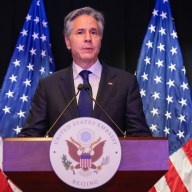
Novelist Gary Shteyngart got to introduce his new memoir, “Little Failure,” in style: in a book trailer starring James Franco, Rashida Jones and fellow author Jonathan Franzen. The trailer was a big hit and the memoir itself has been receiving rave reviews. The author of 2010’s celebrated “Super Sad True Love Story” tooksome time to answer a few questions about his Hollywood connections, the relative aging rate of Russian men and what it’s like to reinvent yourself as an American.
How did your book trailer with James Franco come about?
Well, he was a student of mine, and I thought it would be nice to make out with him for a while on camera. I mean, it’s a dream that many people of all sexual orientations have, and he was kind enough to say ‘yeah, I’ll wear the bathrobe.’ We had a lot of takes. There were many, many takes on this, and then we finally settled on one that was pretty sexy, I thought.
You were forced to make out with him over and over again.
Let’s say he was forced to make out with me. For me, it was pure pleasure.
I thought Franzen looked really relaxed and natural onscreen.
He’s a natural! I think he’s probably had a little acting, in college or something, because he was great. He wasn’t a ham, he wasn’t overdoing it, he wasn’t underdoing it.
Will James Franco be appearing in all of your book trailers?
Well, he appeared in the previous one. I did one with him, I did one with Paul Giamatti. I love to work with actors who can make my neuroses come alive on the screen.

What made you decide to write a memoir?
It’s time. You know, I’m 41, and in Russian years that’s 67. How much more time do I have left? I had a kid of my own and I thought it would be nice to figure out what my upbringing was like, so I don’t do that to him, but also keep the good stuff about it as well, the humor and the love. Also, I feel like I’ve been working on this material for a long time and I want to use it so I can move on to other stuff, stuff that maybe doesn’t involve as many Russian Jews as my previous stuff did.
While you were writing the memoir, was it ever hard to decide which stories made sense as a part of the general narrative?
At first there was a bunch of essays I’d written and I thought maybe I’d just put out a book of those, but it felt like the connective tissue was missing. So I began to fill in the blanks and the method I used is that I woke up every morning, before writing, and thought, I’m 9 years old. What’s the world going to look like today for me? Who are my enemies, who are my friends, what do I have to get through — there’s all this different stuff that I have to survive. What’s it like? There were periods of my life that I felt were real triumphs. I discovered Manhattan and went from being a provincial Yeshiva boy to a kind of worldly Manhattanite, but even that transition was very difficult. It required a loss of a lot of things that I loved.
There is a lot of reinvention that’s happening along the way in there.
That, I think, is native to my other novels. There’s always the sense of reinvention that people undergo, or suffer, if you want to put it another way. No one is ever happy with being who they are. But that’s a great trope in writing fiction, in general. That’s the question: if you have people who are static, then why write about them?
















